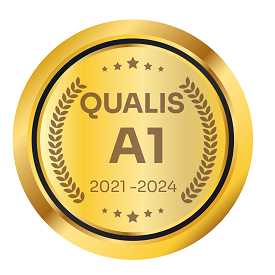Educación museística y formación de identidad regional
DOI:
https://doi.org/10.22633/rpge.v25iesp.7.16152Palabras clave:
Educación museística, Antropocentricidad, Interactividad, Cultura participativa, Identidad regionalResumen
La educación museística es un campo específico dedicado a desarrollar y fomentar espacios e instituciones de educación no formal como los museos. Su objetivo principal es interesar a los visitantes en experiencias de aprendizaje para mejorar su curiosidad y compromiso con sus objetos y colecciones. Las tendencias generales de globalización provocan cambios en las estrategias de comunicación de los museos. El museo está siendo considerado como una institución cultural, que se está convirtiendo en un centro cultural multifuncional de orientación antropocéntrica en este contexto global. Se proponen los principales criterios de análisis de la comunicación museística moderna y en este artículo se exponen las formas típicas de actividades educativas de los museos regionales. También demuestra su potencial para la formación de la identidad regional.
Descargas
Citas
CAMERON, D. F. The museum, a temple or the forum. Curator: the museum j. 1971. v. 14, p. 11-24. Available: https://search.rsl.ru/ru/record/01004594493. Access: 10 Jan. 2021.
DUKELSKIY, V. J. Introduction. In: DUKELSKIY, V. J. (Ed.). Museum communication: models, technologies, practices (executive editor V. Ju.Dukelskiy). Moscow, 2010. 199 p.
DUKELSKIY, V. J. Museum in the communication system of the territorial formation. In: DUKELSKIY, V. J. (Ed.). Museum communication: models, technologies, practices (executive editor). Moscow, 2010. 199 p.
GOLOVNIOVA, E. V. Regional identity and identity of region. Bulletin of Ural federal university, Series 3: Social sciences, p. 182-188, 2017.
HUDSON, K. Museums of Influence. Cambridge University Press. 1987. 220 p.
KATKOVA, K. F. Definition and functions of regional museum of 21-st century. Bulletin of the St. Petersburg State Institute of Culture, v. 212, p. 103-106, 2017.
KOMLEVJU, E. Formation and development of museum communications in the cultural space of region. Abstract of the dissertation for the degree of Doctor of Cultural Studies,St. Petersburg, 2011. 40 p. Available: https://avtoreferat.seluk.ru/at-kulturologiya/8324-1-formirovanie-razvitie-muzeynih-kommunikaciy-kulturnom-prostranstve-regiona.php. Access: 10 Jan. 2021.
KORSBÆK, N. Museum Communication: Learning, Interaction and Experience, University of St Andrews. September. 2014. Available: https://core.ac.uk/reader/30318151. Access: 10 Jan. 2021.
LEBEDEV, A. Leiden dialogues. In: DUKELSKIY, V. J. (Ed.). Museum communication: models, technologies, practices. Moscow, 2010. 199 p.
MASTENITSA, E. N. Museum world in the XXI century: development vectors. Bulletin of the St. Petersburg State Institute of Culture, v. 212, p. 19-26, 2015.
NIKONOVA, А. А. The role of the museum in the formation of cultural identity. Questions of museology, n. 2, 2010. Available: https://cyberleninka.ru/article/n/rol-muzeya-v-formirovanii-kulturnoy-identichnosti. Access: 10 Jan. 2021.
PAVLOVA, N. New meanings of museum communication: from existence of knowledge to co-existence of comprehension. In: DUKELSKIY, V. J. (Ed.). Museum communication: models, technologies, practices. Moscow, 2010. 199 p.
SAPANZHA, O. S. The development of views about museum communications. Bulletin of Herzen State Pedagogical University of Russia: Series: Linguistics and Literary studies, p. 245-252, 2009.
SIMON, N. The Participatory Museum. Santa Cruz, CA: Museum 2.0. 2010. Available: https://yandex.ru/search/?text=N. Symon part museum&lr=4&clid=2186617. Access: 10 Jan. 2021.
TRIBUNTSEVA, К. М. Origin and construction of Belgorod serif line. Bulletin of BSTU named after V.G. Shukhov, Series: History and Archaeology, v. 6, p. 86-90, 2017.
YAKOVLEVA, E. Michail Piotrovskiy: The luxury of solitude: people and museums in a pandemic – how to overcome fear and find yourself. Rossiyskayagazeta: Phederal release, v. 11, n. 8362, 2021. Available: https://rg.ru/2021/01/20/piotrovskij-liudi-i-muzei-v-pandemiiu-kak-preodolet-strah-i-najti-sebia.html https://rg.ru/author-Elena-Yakovleva/. Access: 10 Jan. 2021.
ZINOVJEVA, J. V.; MATSKEVICH, J. J. Museum in outer interactions: museum and a local community. Proceedings of the St. Petersburg State Institute of Culture, v. 212, p. 83-91, 2015.
ЕREMINA, E. V. The concept of regional identity and the specifics of its formation in modern Russia. Social and humanitarian knowledge, 2012. Available: https://cyberleninka. ru/article/n/ponyatie-regionalnoy-identichnosti-i-spetsifika-ee-formirovaniya-v-sovremennoy-rossii/viewer)/. Access: 10 Jan. 2021.
СESLINSKA, I. The XXI century museum. 2014. 13 p. Available: http://t-c-n.ru: musei21.pdf. Access: 10 Jan. 2021.
Publicado
Cómo citar
Número
Sección
Licencia
Derechos de autor 2022 Revista on line de Política e Gestão Educacional

Esta obra está bajo una licencia internacional Creative Commons Atribución-NoComercial-CompartirIgual 4.0.
Manuscritos aceitos e publicados são de propriedade da Revista on line de Política e Gestão Educacional. É vedada a submissão integral ou parcial do manuscrito a qualquer outro periódico. A responsabilidade do conteúdo dos artigos é exclusiva dos autores. É vedada a tradução para outro idioma sem a autorização escrita do Editor ouvida a Comissão Editorial Científica.











